Buddy to lead Indigenous All Stars
- Tuesday, January 29 2013 @ 09:11 pm ACDT
- Contributed by: Troy Thompson
- Views: 2,751

The AFL is pleased to announce that Hawthorn star Lance Franklin will captain the Indigenous All Stars when they take on the Richmond Football Club on Friday, February 8 at 7pm in Alice Springs.
Supported by the Coles AFL Indigenous program, the match will be played at Traeger Park and will showcase the Indigenous talent in the AFL.
Franklin said he is proud to captain the All Stars for the first time and looks forward to the match against Richmond.
"The Indigenous All Stars match is a really important event as it recognises the Indigenous Australians' contribution to the national competition. It's a chance for some of the best Indigenous talent from across the country to play together."
It was also reported today in the Herald Sun that Franklin would like to have the Indigenous team play in a three team International Rules competition against the Irish and Australian teams "Personally, I would love to see the All Stars take on the Australia and Ireland teams. That would be great recognition for the indigenous players."
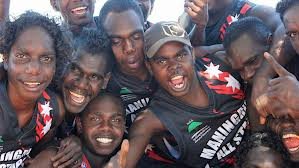 The indigenous community of Maningrida almost defines the term “remote”. It sits on the estuary of the Liverpool River in Arnhem Land, right where it flows into the Arafura Sea. The nearest town of size is Jabiru, “a coupla hundred clicks [kilometres] away” according to one local. Darwin, the nearest capital city, is 400 kilometres away to the west. Like so many other remote communities throughout the “Top End” of Australia, that remoteness can be both its charm and its curse.
The indigenous community of Maningrida almost defines the term “remote”. It sits on the estuary of the Liverpool River in Arnhem Land, right where it flows into the Arafura Sea. The nearest town of size is Jabiru, “a coupla hundred clicks [kilometres] away” according to one local. Darwin, the nearest capital city, is 400 kilometres away to the west. Like so many other remote communities throughout the “Top End” of Australia, that remoteness can be both its charm and its curse.
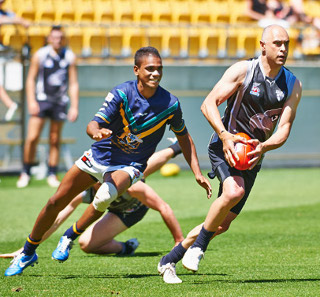 Saturday’s Australia Day clash between the AIS U 17 squad and New Zealand provided a good contest but ultimately the talented Aussie youngsters were too good despite the Hawks fielding a team including AFL legend Wayne Schwass (pictured left), VFL champion forward Khan Haretuku and Hawthorn International Rookie Shem Tatupu.
Saturday’s Australia Day clash between the AIS U 17 squad and New Zealand provided a good contest but ultimately the talented Aussie youngsters were too good despite the Hawks fielding a team including AFL legend Wayne Schwass (pictured left), VFL champion forward Khan Haretuku and Hawthorn International Rookie Shem Tatupu. 
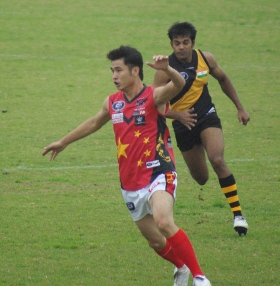 worldfootynews.com is commencing a series of articles about the future of Australian football in Asia.
worldfootynews.com is commencing a series of articles about the future of Australian football in Asia.

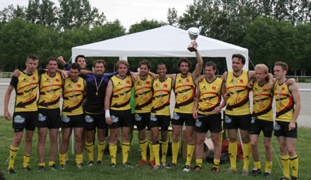
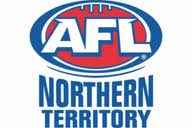 Opportunities for junior talent throughout the remote areas of the Northern Territory to follow Australian Rules football pathways have been enhanced, as outlined in this media release from AFLNT.
Opportunities for junior talent throughout the remote areas of the Northern Territory to follow Australian Rules football pathways have been enhanced, as outlined in this media release from AFLNT.
 The New Zealand Hawks team to play the visiting AIS AFL Academy side at Westpac Stadium on Saturday the 26th of January has been announced with a major shock being the inclusion of 44 year old AFL legend Wayne Schwass joining Frankston’s VFL powerhouse forward Khan Haretuku on-field. Schwass (pictured left), who was born in NZ, will fulfill a lifelong ambition to wear the Silver Fern and his involvement is sure to not just be good for him but great for football. He played 282 games across his career with North Melbourne and the Sydney Swans.
The New Zealand Hawks team to play the visiting AIS AFL Academy side at Westpac Stadium on Saturday the 26th of January has been announced with a major shock being the inclusion of 44 year old AFL legend Wayne Schwass joining Frankston’s VFL powerhouse forward Khan Haretuku on-field. Schwass (pictured left), who was born in NZ, will fulfill a lifelong ambition to wear the Silver Fern and his involvement is sure to not just be good for him but great for football. He played 282 games across his career with North Melbourne and the Sydney Swans.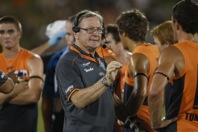 Head Coach Kevin Sheedy will visit Elcho Island off the coast of Arnhem Land in the Northern Territory tomorrow to launch a new partnership between the Giantsand the Galiwin'ku community. Sheedy, a passionate advocate of Indigenous Australia, will meet members of the community and attend a local football match.
Head Coach Kevin Sheedy will visit Elcho Island off the coast of Arnhem Land in the Northern Territory tomorrow to launch a new partnership between the Giantsand the Galiwin'ku community. Sheedy, a passionate advocate of Indigenous Australia, will meet members of the community and attend a local football match.

 RSS news
RSS news Twitter
Twitter Facebook
Facebook